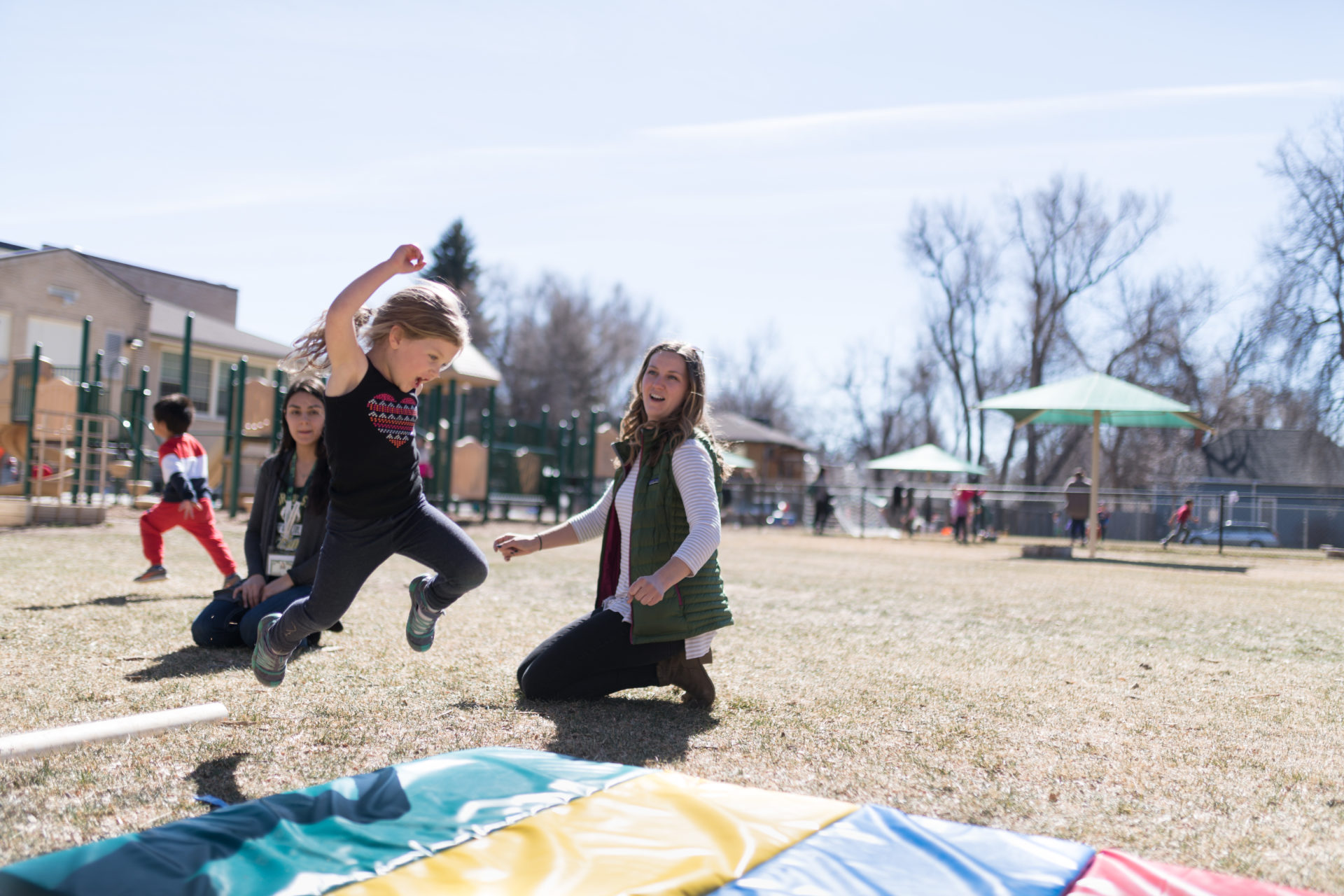
In 2015, CSU’s Department of Occupational Therapy and the CSU Early Childhood Center, housed in the Department of Human Development and Family Studies, began an interdisciplinary collaborative research and practice partnership. This partnership set out to explore how occupational therapists could support children in a play-based early childhood education center and better understand parent perceptions around occupational therapy involvement at the center.
CSU’s Early Childhood Center serves a three-fold mission of teaching, research, and service. The teaching mission is to provide hands-on learning opportunities for CSU students interested in careers working with children and families. The research mission is to promote diverse opportunities for observational and applied research related to children, families, and early childhood education. The service mission is to provide high quality play-based and child-directed educational programming for children ages 6 weeks to 6 years.
Training occupational therapists
CSU’s Department of Occupational Therapy educates and trains graduate students to become occupational therapists who help people best function in their everyday environments (home, work, school, etc.). In the context of occupational therapy, “occupations” refers to the everyday activities that people do to occupy their time and bring meaning and purpose to their lives. To achieve this, occupational therapists help assess how individuals function within their daily environments, then propose interventions and adaptations that can improve competence and satisfaction with daily life.
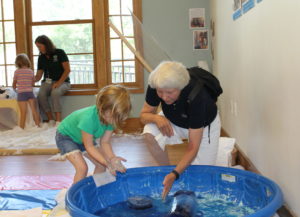
When it comes to pediatric OT, occupational therapists are concerned with how children interact within their living and learning environments to engage in play and other meaningful activities given their developmental level, abilities and interests.
Since 2015, graduate-level occupational therapy students at CSU can complete their pediatric fieldwork requirement at the Early Childhood Center. Thanks to generous donors like Jody and Mike Werner, OT students are able to gain hands-on experiences that will prepare them for entry-level OT practice. Haleigh Chwirka, a second year master’s student in the Department of Occupational Therapy, recently completed her pediatric fieldwork at the Early Childhood Center.
“As an occupational therapy student at the ECC, I had a unique opportunity to collaborate with teachers and parents to provide the best learning environment for the children,” said Chwirka. “Thanks to this joint effort, therapeutic interventions were more effective because they were implemented in the classroom and at home. Furthermore, I was able to gain skills to support all age groups and developmental milestones after learning from each teacher’s expertise.”
Supporting children as they learn
The ECC’s Reggio Emilia-inspired philosophy provides an emergent approach to educating children that is play-based and child-directed. Because of this philosophy, the ECC is an ideal location for occupational therapy students and faculty researchers to observe how children play and learn. They can also help assess, intervene and coach a child through challenging tasks that could have beneficial effects on the child’s long-term development.
“Some 90% of brain organization occurs by the age of 5 years, making the early childhood years a critical time for developing social thinking, emotional-management and positive approaches to learning,” said Lisa Fyffe, assistant professor in Occupational Therapy. “Integrating occupational therapy within a play-based early childhood education amplifies the unique strengths of both professions and provides an excellent learning environment for the OT students and early childhood educators involved in the partnership.”
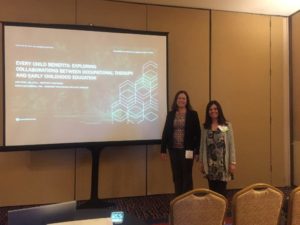
“The ways that children are nurtured during the first five years of life are foundational to their future health and development,” said Karen Rattenborg, executive director of the Early Childhood Center and assistant professor in Human Development and Family Studies “This is why the collaboration between the ECC and the OT Department is so beneficial. It not only supports the development of the children in our care, it also provides a training environment for the next generation of professionals so that they can implement best practices for children and families.”
Four steps to enrichment
While at the ECC, OT students are supervised by Fyffe and learn how to devise and document enriching experiences with the children that help foster engagement, mastery, and enjoyment across the various activities and environments of the school day. Fyffe and her students utilize four mechanisms that guide OT involvement:
- Classroom based interventions – these interventions involve small groups of children rotating through a planned activity. The OT students intervene in the moment by immediately modifying or coaching the child through a challenging task. The time spent in the classroom affords the OT student with a valuable look at children across their day, and allows for strong rapport to be built with both the children and teachers.
- Individual provocations – the OT students work intentionally with an individual student. At times, this might be a one-on-one interaction but more commonly involves a child and a few friends.
- OT Day at the ECC – each week throughout the summer, OT students plan a theme-based obstacle course promoting playfulness, social skills, and specific developmental skills such as eye-hand development or balance. The activities and equipment are modified depending on each age group and interests of the children.
- Inter-professional consultation with teachers – a dedicated meeting for the OT students to share observations with the ECC teachers. The two sets of professionals work together to solve problems and provide support based on teacher and child priorities and needs.
Helping parents help their children
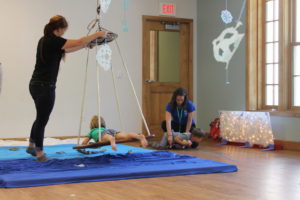
Anecdotal stories from ECC parents such as Katie Brayden incentivized Fyffe and Rattenborg to team up on interdisciplinary research that could better quantify and capture the benefits from including occupational therapy at the Early Childhood Center.
“As a first-time parent, I would have never noticed the delay that my son was experiencing if not for the strong collaboration between the OT Program and my son’s teachers at the ECC,” said Brayden. “They recognized that there was an issue, evaluated the significance of it, and suggested possible next steps. Because of this partnership, we were able to intervene early, and today my son is confident, happy, and ready for kindergarten. Through this process, we learned that delays such as his could have been a real barrier to learning, and I’m so grateful for the OT’s and his teachers for making sure that outcome was not part of his story. Every child should have access to these kinds of resources.”
Fyffe and Rattenborg began a several-years-long research project focused on two key issues:
- Understanding what aspects of play-based education and pedagogy are most meaningful to parents.
- Better gauging if parents see value in occupational therapy interventions to support play-based education.
To date, Fyffe and Rattenborg have surveyed more than 39 ECC parents and created follow-up parent focus groups. From these two groups, they have identified four themes that provide some feedback as to why parents value play-based education and OT involvement at the ECC. The themes are:
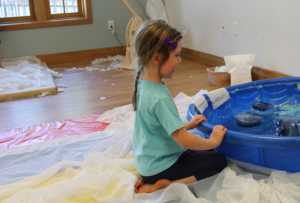
- Advances Social Relationships – Children acquire interpersonal relationship skills through the process of play. Parents in the study noted benefits such as the child’s ability to adjust behavior and navigate conflict and other emotions.
- Builds learning readiness – Children develop intrinsic character traits as a result of play. Parents in the study described traits such as autonomy, creativity, self-discovery and confidence.
- Develops learning approaches – Children become more adaptable in their responses to novelty and challenges as a result of play. Parents in the study described their children exploring new environments and objects, being completely absorbed in learning tasks, and being able to make and enact choices that direct their own learning. Parents believed exposure to play fostered good decision making, promoted critical thinking and allowed for more self-direction.
- Respects learner differences – Children learn to honor their individuality (varying temperaments, skills and interests) in a safe environment through the process of play. Parents in the study described how their children were able to learn at their own pace, follow their interests, and influence the timing and dosage of learning.
Fyffe and Rattenborg also found that parents reported that the OT’s presence at the ECC helped advance their child’s self-regulation and control; improved their child’s confidence with body skills; and improved their child’s risk-taking. Parents also shared that the occupational therapists greatly assisted with finely tuning motor skill acquisition in the early years, and were able to support children across all classrooms by identifying supports and strengths that improved attention, sensory processing and movement skills.
“This partnership between CSU OT and the ECC is truly a positive experience for all parties involved,” said Chwirka.
To support the ongoing interdisciplinary partnerships between the Department of Occupational Therapy and the Early Childhood Center, please consider supporting the OT/ECC Collaborative Research Fund.
The Department of Occupational Therapy, Department of Human Development and Family Studies, and the Early Childhood Center are all part of CSU’s College of Health and Human Sciences.